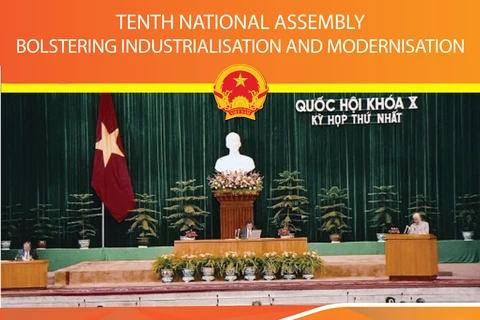 Deputy head of the Party Central Committee’s Economic Commission Nguyen Duc Hien (Photo: Vietnamplus)
Deputy head of the Party Central Committee’s Economic Commission Nguyen Duc Hien (Photo: Vietnamplus) Hanoi (VNA) - In his remarks, deputy head of the Party Central Committee’s Economic Commission Nguyen Duc Hien cited the 13th National Party Congress' resolution which set the target for Vietnam to become a developing country with modern industry and upper-middle-income status by 2030, and a developed and high-income country by 2045.
He also cited several resolutions of the Politburo which direct speeding up industrialisation and modernisation on the basis of scientific and technological development and innovation, and the integration of information and automation application in industrial production to create intelligent production processes, smart factory models, and manufacture smart products.
Accordingly, attention will be paid to promoting the development of science, technology and innovation across the fields, and speeding up national digital transformation so that Vietnam soon becomes one of the leading smart manufacturing and service centres and entrepreneurship and innovation hubs in Asia with high labour productivity, and qualified workforce to master and apply modern technology in all fields.
Citing data from the World Bank in East Asia and the Pacific and the Ministry of Science and Technology, the official pointed out that developing smart production in the process of industrialization and modernization to 2030, with vision to 2045, will face many difficulties and challenges.
The symposium offers a venue for managers, manufacturing enterprises, and suppliers to share experience to promote digital transformation, digitalization and automation of production process, he said.
According to Deputy Minister of Industry and Trade Do Thang Hai, the proportion of processing and manufacturing industry in GDP would reach 16.7% in 2020. Of which, the proportion of medium and high-tech industries accounts for 40% of the whole industry’s added value and export turnover.
According to results of a survey conducted by the Ministry of Industry and Trade on the readiness of Vietnamese industries prior to the Industrial Revolution 4.0 with a 5-point scale, most industries had scores below 2.5 in all aspects.
Deputy Minister Do Thang Hai proposed a number of strategic orientations, including those on perfecting institutions, policies and legal documents, creating a driving force for industrial development, and new approach, mindset on industrialization, modernization, among others.
In addition, the Deputy Minister stressed that it is necessary to focus on two factors that help improve competitiveness of domestic enterprises and strengthen linkage between domestic enterprises and foreign direct investment (FDI) sector, as well as the global market.
Deputy Director General of the Ministry of Industry and Trade’s Science and Technology Department Dao Trong Cuong said developing smart production in the process of industrialization and modernization is a particularly important task.
This is both an opportunity and challenge for Vietnam to accelerate the transition from assembling and processing to manufacturing "make in Vietnam" products, master advanced production technologies, and promote research and development (R&D) in producing digital devices such as smartphones, smart TVs, and tablets, he stressed.
Participants discussed issues related to smart production, with local organisations and enterprises sharing their experience in applying digital technology in smart production, setting up production and digital transformation models in enterprises, exploiting digital technology in optimising operation of production platform, developing smart factories on old foundation, and digitising supply chains to improve production efficiency./.






















